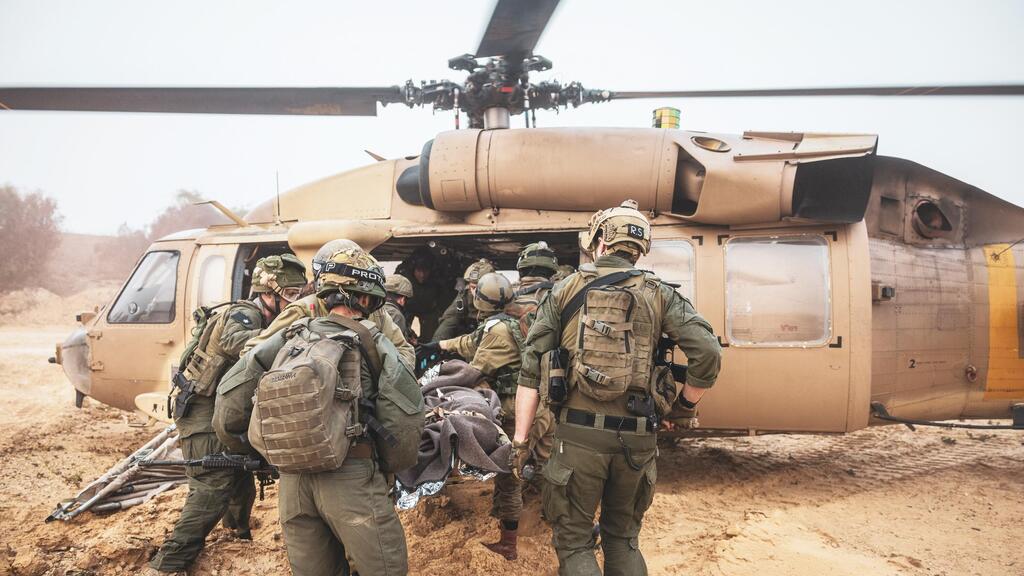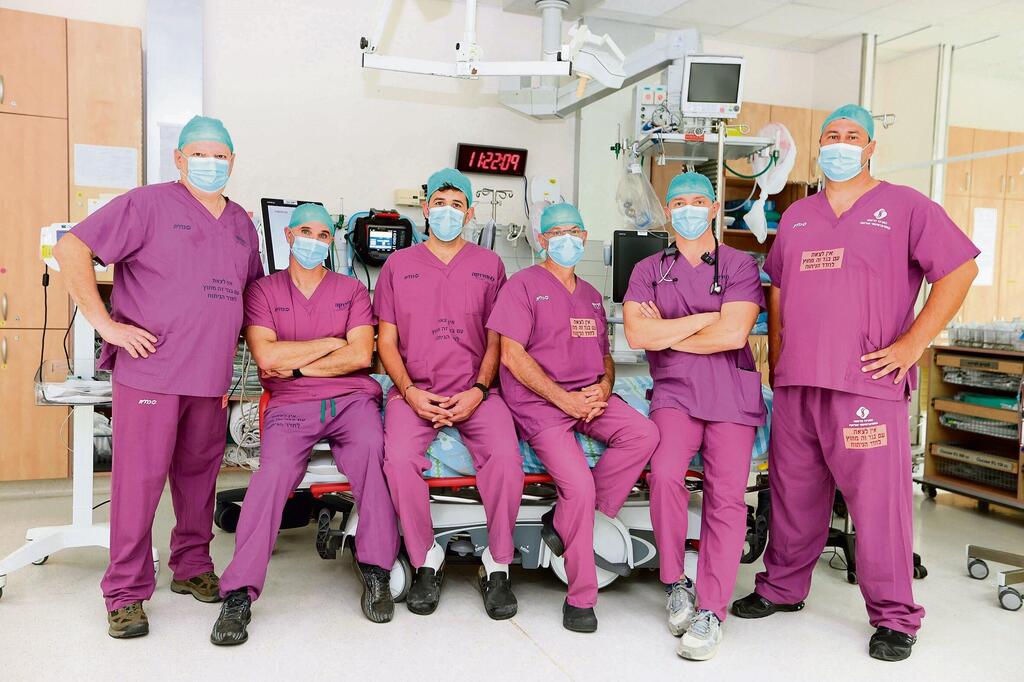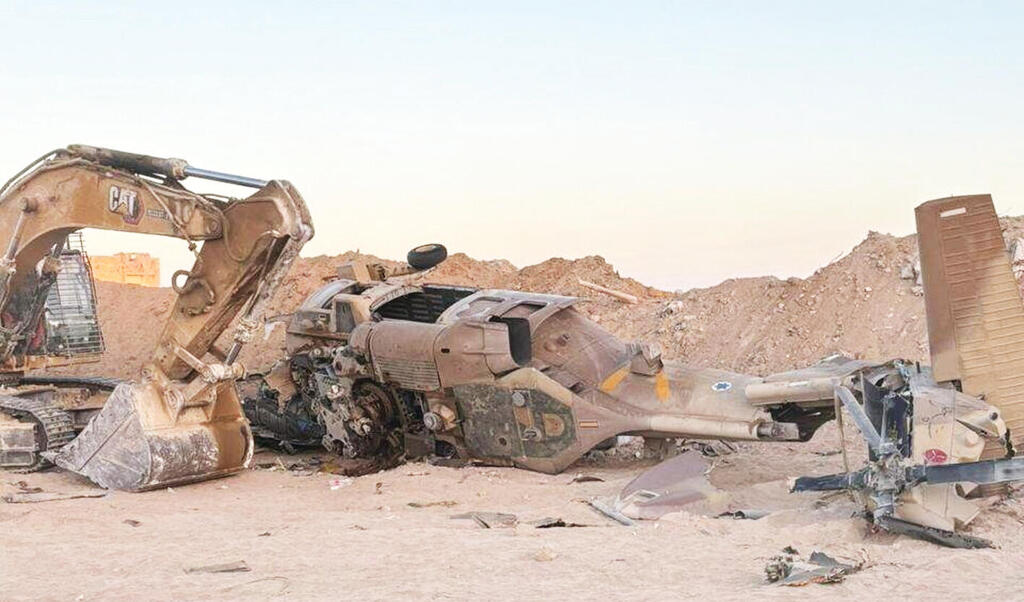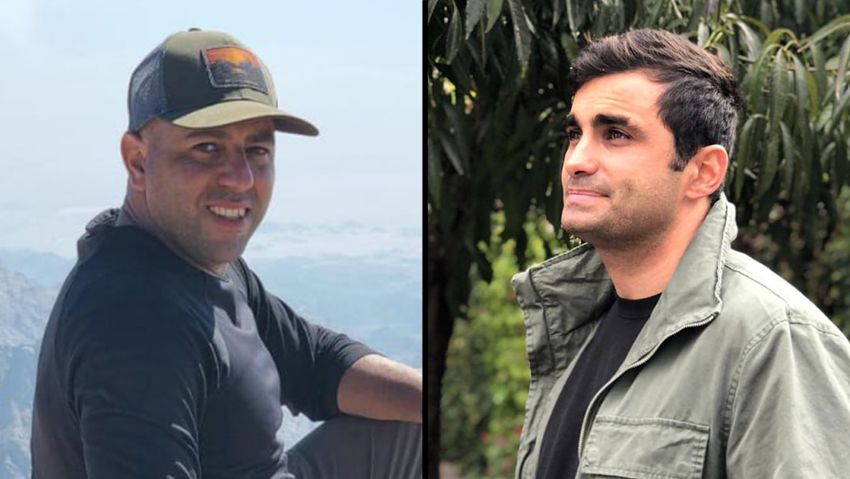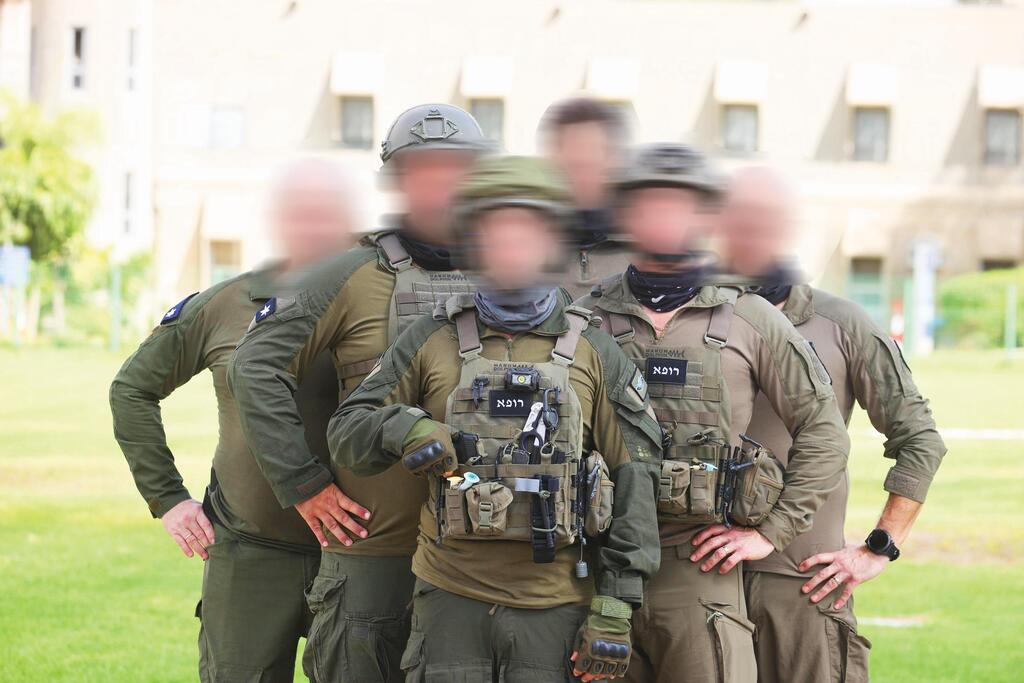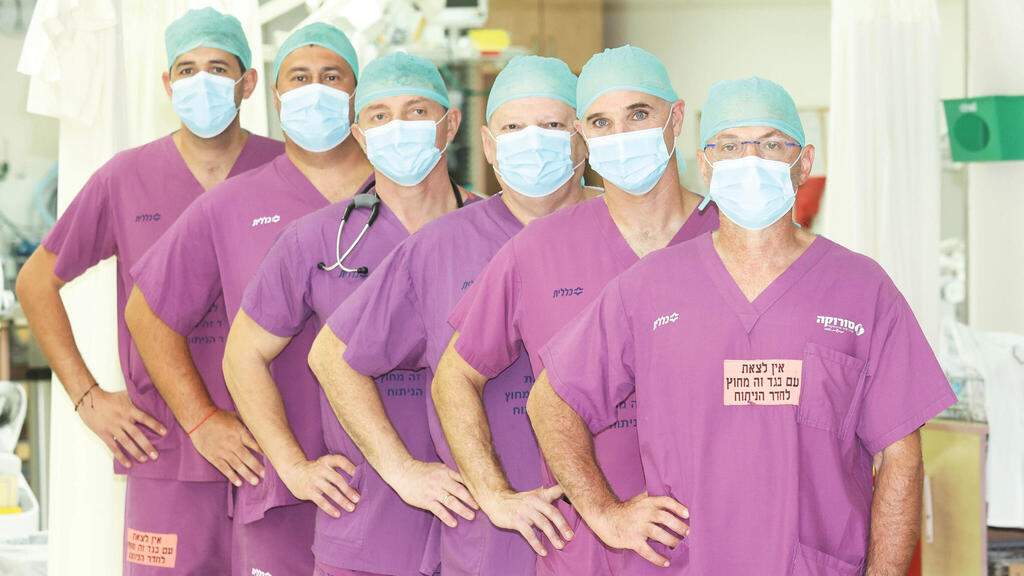On the first night of the Gaza ground operation, the wounded young armored corps soldier that Sgt. Maj. (Res) Dr. Y. was treating, died in his arms. “We were at a base in southern Israel,” says Y.” At 2am, we were called to treat armored corps guys who’d been hit by an anti-tank missile. His mother is the first thing I think about in such situations. Someone’s son is now lying wounded somewhere in Gaza, waiting for us to come get him out of there. If his mother knew what was happening, what wouldn’t she do to save him?”
The helicopter landed in southern Gaza. “We landed in the dark. The doors opened, and I saw the guys treating him running toward us. I couldn’t make out their faces. They were all covered in dust, but you know that whoever’s running toward you now is your best friend. Under different circumstances, you’d hug one another and drink coffee together. Now, they were shouting out the treatment they’ve given him. We took off back to Israel. We had three, men from this incident: One severely wounded, one in critical condition, and the other was relatively okay.”
Dr. Y. says that choosing who to treat is simply a game of roulette. There’s nothing you can change. You’ve been given a wounded soldier. Now he’s yours. This was the situation on that flight. “I could hardly see a thing” he says. “It was dark and we were flying with no lights. I put my hands on his chest and face and couldn’t feel anything. I hooked him up to the machines and realized that he was in a very bad way.”
“I did everything I could to save him. I administered artificial respiration and gave him a blood transfusion. I only saw the severity of his injury as we turned on the helicopter lights on entering Israeli territory. I didn’t for a moment think he was dead. I also didn’t stop. We treated him until landing at Soroka. I’ve never been so happy to see the hospital lights.”
The helicopter landed, and Y. rushed to the medical team with his wounded man. “I ran with him into the trauma center, panting and shouting ‘low blood pressure, no vital signs’. My friends at the hospital weren’t moving. No one approached us. No one was helping me. With a sad look on their faces, they just took the ventilator from me.”
“I kept telling them what his condition was. And 30 people were just looking at me, realizing he’d already died. I hadn’t gotten it yet. Then it hit me. I asked ‘What? That’s it?’ And they nodded. The deputy hospital director patted me on the shoulder and the anesthesiologist gave me a kiss. I started crying. It was such a blow. I believed in what I was doing, in the treatment I was administering on the way. And he’s not with us anymore.”
In his journal, Y. describes the terrible moment he parted from the young soldier he tried to save. “I’m no longer his medical caregiver. I’m a citizen for whom he died. I lean in toward him, looking at his beautiful face, one hand tightly clasping his hand, the other on his shoulder. I begged his forgiveness. The mother was echoing in my head. God help us. If only she knew, she’d tear out her heart and switch it with his.”
This is how the IDF’s most combat doctors sound. They’ve been in action for a year, saving lives on the battle field and in the safe and familiar hospital setting. They respond to any call to any injury or military altercation, land in the warzone, invariably under heavy fire, and evacuate the wounded to Israel. Just so that soldiers may come back to life, recover, and get back to themselves and to their families.
Unit 669, or as it’s officially known, the “Tactical Unit for Special Rescue” is a special IDF elite unit. Its role is to evacuate the dead and wounded from war and disaster zones. Unit combatants whose names cannot be published show up at evacuation zones in helicopters and on foot to evacuate those demanding medical treatment.
Since the war began, the unit has conducted 800 rescue flights within the Gaza Strip, evacuating over 1,800 wounded to trauma centers across the country, providing them with urgent, lifesaving medical care on the way. In the current war, some are also operating on foot alongside infantry forces inside Gaza.
For this article, we interviewed six Soroka doctors serving in 669: Maj. (Res) Dr. S (58); Sgt. Maj. (Res) Dr. Y. (35). Lt. Col. (Res) Dr, A (58); Maj. (Res) Prof. Y. (48), Maj. (Res) Prof. A. (52) and Maj. (Res) Dr. L. (50). They’re all married with children. Some have grandchildren.
This is an extraordinary, elite team of people who, for the past year, have been dividing their time between routine work in the busy southern trauma center that treated the wounded on October 7, and has since treated hundreds of wounded soldiers, saving lives in Gaza, and risking their lives on every mission. They’re called to the danger epicenter at every hour, day or night, fight for the lives of the wounded, even if it seems hopeless.
They hail from varied professional medical backgrounds. They’re surgeons, intensive care specialists, anesthesiologists and orthopedic doctors. Some are young, setting out on their medical careers. Others are senior doctors, including department heads in their 50s at top of their profession. Their age and hospital positions have long released them from reserve duty, but they adamantly refuse surrendering the right to save lives.
“We get to the field, with all our hearts in it, knowing we have to reach them as quickly as possible and bring them in for medical care” says. Prof. Y. “The number of wounded can sometimes hinder you. Lots of evacuations are conducted under fire. There’s a lot of shelling and artillery fire, but you show up with a clear goal: finding the wounded as quickly as possible, and bringing them back alive into Israeli territory, to a hospital that will treat them. This makes the difference between life and death. Emotions come later.”
“Two weeks ago, they turned from doctors to patients. Operations of this small secret unit, the identity of whose members cannot be published, that’s usually conducted in the shadows, were recently exposed to the public. Due to poor terrain conditions, a Yasur helicopter on a routine mission evacuating a soldier shot in southern Gaza, crashed a few seconds before landing. Two combat soldiers Sgt. Maj. (Res) Daniel Alush and Sgt. Maj. (Res) Tom Ish-Shalom were killed in the incident, and eight more were injured, some severely, including the male and female pilots flying the helicopter, and two airborne doctors. Conditions of all injured have since greatly improved and they’re now out of danger.
“I got a call from the unit in the middle of night, telling me there was an extraordinary incident” says Lt. Col. Dr. A. “Before leaving the hospital, I asked myself what should I be wearing now – Soroka scrubs or my army uniform? I went for the uniform, thinking that my friends, lying in beds as “wounded,” would feel safer in the company of brothers in arms.
The incident’s severity soon became clear. “This wasn’t my first time in war finding myself treating people I know” says A. But the large number of wounded meant I needed to deal with it differently. I was not only helping treat them. I also had to brief the unit, whose people were extremely concerned.”
“My work demands I separate my mind from my heart. The work becomes technical. It was impossible in this case. These are people I’ve known for years: The pilots and the helicopter mechanic with whom I’ve flown so many times. They’re all very close friends. You could call them family. In recent months, I’ve spent more time with them than at home. We’ve been together in extremely dangerous situations. Together we’ve saved lots of soldiers’ lives.”
How do you deal with such situation, the difficulty of treating the people closest to you?
“Our accrued experience demands we behave in a certain way. Otherwise, the treatment result won’t be as good. It sinks in later. We felt we had to represent our friends to their families and make them feel they’re in the safest possible place that we’d provide them with the best treatment possible. It’s very important for me to support people who aren’t from the medical profession – pilots, mechanics and their families, giving them the feeling that everyone’s with them, in the same boat.”
All this as everyone in the unit know that, under different circumstances, on a different day, it could have been them there, lying in the trauma center bed
“We subconsciously know that this is an incident that could occur. The team involved in the incident had replaced me on my standby shift. Our tasks are completely identical. The chances of my lying there on the bed are exactly the same as theirs. If circumstances were different, they could be treating me.”
Maj. Prof. A, also a senior hospital and unit doctor, chose to deal with the incident differently. “I’ve developed the ability to block out things that interfere with my functioning” he says. “The injured need me as a doctor, and I function as such. A few hours after the incident, the doctors in the WhatsApp group were talking about the incident, writing about how sad it was. I wrote, ‘Guys, we need to be strong. Our next wounded are waiting for us’.”
“Through the years, we take risks. As soon as a helicopter takes off, there are risks from both above and below. It’s no secret. I’m sure if before taking off in the helicopter, you were to tell those who fell in the course of duty, that it may crash that day, they’d stay on that helicopter.”
And what about you? You’re part of the unit not just in medical terms, but also in the fighting. You’re exposed to its dangers. Does this kind of incident scare you?
Dr. A. “I’m going back to reserve duty today. The soldiers need me. I have to give them everything I can. I spoke to the pilot. We told him that we completely trust him and what they’re doing, and that we’re not afraid. We’re going out into the field again tomorrow.”
Protocol for treating the wounded on the battlefield has changed during this war. Rather than trying to save them with daring and dangerous operations demanding time and space, the wounded are stabilized and evacuated to the hospital as quickly as possible. In more urgent or severe, imminently life-threatening cases, they’re taken to Soroka, a ten-minute flight from the Gaza Strip.
Maj. Prof. A says: “We do our best not to do anything we don’t have to. We stabilize the patient while we’re on the move and only do what we must to save him - giving him blood transfusions, opening veins. We less administer respiration and tracheal intubation (inserting a tube into the trachea windpipe). The helicopter is a substitute for the hospital. We’re guided by getting to the hospital as quickly as possible to provide the patient with the best care.”
“The most critical decisions are those taken in the first minute of treatment. Whatever’s decided in those moments can often determine whether the patient lives or dies. It’s an enormous responsibility. I think we do this extraordinarily well. You have seven or eight minutes before reaching the hospital to prepare everything you need. You can’t delay getting him into the trauma center even for a second after the helicopter has landed.”
“There are days we fly almost non-stop” says Prof. Y. “We land in the field near the wounded man and get him to the hospital as fast as we can. The injuries from this war aren’t just from guns. There are lots of shrapnel and explosive devices too. The team also knows that, even after one of our patients dies, we have to carry on working. More wounded men are waiting for us in the field. We draw our strength from our success stories.”
And, thankfully, there’s no shortage of these stories. “In the war’s first week, we were called to rescue wounded men” says Prof. A. “One of them, we were told, was in a stable condition. His condition, however, quickly deteriorated on the helicopter. We started giving him blood transfusions and administered artificial respiration. He had head injuries and had been hit on the arms and legs. We brought him to Soroka where we opened his chest to massage his heart muscles. He underwent a series of operations, and gradually regained consciousness. When I came back from the army, I carried on treating him. He spent a month with us and then onto rehabilitation. When I tell my team about this case, it really makes their day.”
Maj. Dr. L. has recently joined the unit after serving as a combat pilot. In recent months, he’s been serving alongside the ground forces. “I’m totally an infantry soldier” he says. “All the unit’s doctors come from the core medical professions. They’re all experienced in treating the wounded in war conditions. Having experienced doctors with them, gives the forces on the ground a great sense of safety.”
“Treating the wounded in the field is very different from how we treat them in the helicopters” says L. “I feel an enormous sense of duty and mission. You reach the wounded on the battlefield minutes, sometimes less, after the injury, armed up like the unit’s combat soldiers. You’re invariably getting shot at and you shoot back if you have to. My purpose as a doctor isn’t killing terrorists, but rather getting to the wounded at any cost, even when they’re firing at my head.”
Haven’t you asked yourself what the hell you’re doing there, running around the alleyways of Gaza with a gun? Is this what you studied medicine for?
“My eldest son is 22. Spending time with the ground forces, with the guys from infantry and the armored corps, who are mostly his age, generates collaboration and brotherhood. Being able to sit together in Gaza and do whatever necessary together, not just fighting or treating the wounded, creates an amazing sense of unity.”
Is closure, knowing what happens to the wounded you’ve treated, important for you?
Prof. Y. “Getting feedback about what happens is very important. The unit’s team know I’m from Soroka. Lots of them say to me, ‘We brought you a wounded soldier. What’s with him?’ They need to know that everything that’s done is done for the best. Even when a wounded soldier dies, it’s important for us to know. It’s closure of sorts.”
“During evacuation, we’re all determined to carry out the mission at its very best” says Dr. Y. “Afterwards, on the landing pad, some cry, others hug. What we do is very rewarding. We’ve brought in soldiers in critical condition, at death’s door, and they survived. We had a soldier from central Gaza in a severe state of shock due to blood loss. When we brought him to the helicopter, he was as white as snow, with blood Oxygen saturation level of 38, the normal level being close to 100. The doctor with me thought that was the end of him. We suddenly saw him slightly gesturing. We said ‘Yallah, let’s go.’ We inserted blood through a hole in the bone and saved his life. His mother’s still in touch with us.”
He says that they do remember the joyful success stories, but that they mainly remember the soldiers they don’t manage to save. “I remember their faces. I have a list of all the soldiers I’ve evacuated. Who survived, and who was killed. It’s not easy. After every mission, everyone looks for their own wounded man, so see what happened with him. It doesn’t always end well. Some die, others have brain damage. We’re still in touch with some of them. We’re invited to their weddings. Changing from my army to uniform to my Soroka scrubs, and meeting people I’ve saved from the hell of Khan Younis, and I see them doing well, is a dream come true.”
The medical team in the field and helicopters fight for the lives of every wounded man, how severe their condition. “It’s important to convey this message to everyone, including the soldiers, families, brother, sisters, wives and girlfriends” says Dr. S. ”We have the most professional people in the army and medical profession in this unit. We treat the wounded in the most professional way. If we show up, they can relax. We’ll do whatever needed to save their loved ones.”
“We don’t give up” says Prof. A. “Despite the standard approach in trauma being not resuscitating anyone with no signs of life following severe trauma, we’ll often keep trying fighting for these guys, both in the helicopters and at the hospital. How can we give up on them? They went to protect us, and we just give up? In the trauma center, they open the chest and massage to heart muscle to save them. The battle for their lives is to the bitter end.”
This desperate and heroic medical care invariably demands unconventional means. “We’ve developed lots of systems that don’t appear in the literature. Medical treatment in the field is very quick, and the wounded that used to die during evacuation, are now reaching the hospital alive. I open a vein with a very broad catheter that allows me to give him blood transfusion within one minute. You get a body, and a few minutes later, after four or five doses, he comes back to life. I’ve no idea how many of these we’ve seen. Patients we were told we couldn’t save have come back to life and recovered. We fight for them until the very last moment.”
To save these wounded, Prof. A. tells us, you need to make decisions very quickly. “What helps in these situations is experience, which we have, along with the medical profession we routinely practice. We can get a wounded man who’s relatively okay, and then he can suddenly decline. You need to make a thousand decisions to save him.”
What’s going on with the injured guys when all this is happening? Can you talk to them, to calm them down, under all this pressure? Can you explain what’s about to happen?
“Generally, what they care about at that moment is what’s going on with their friends. Amidst the helicopter noise, with our helmets on, we shout, ‘Everything’s okay, you’ll live. We’ll be at the hospital in five minutes’. It’s very important to calm them, and we do that. At the hospital, the first thing we ask anyone who’s conscious, is their parent’s or wife’s telephone number. We give him a minute before respiration to exchange a few words with his family and explain what’s happened.”
“These soldiers, who survive injuries, will often develop post-trauma. I’m sure those minutes you spend calming them down, telling them ‘Everything’s okay. We’re going to save you and you’ll go back to living as you were before you were injured’ are critical in averting post trauma.
What happens when, as a doctor, it’s already clear that what you’re promising isn’t going to happen?
“I lie. And there’s a very good chance he won’t even remember what went on there, under the influence of the painkiller and sometimes anesthetic medication. I believe this lie is for the best.”
“Evacuations aren’t always tragic” says Dr. Y. “You also get magical, even comical moments. We had an American lone soldier who was psyched that we’d come to rescue him in a helicopter. He stared out of the window, stunned that he was in a Black Hawk. Midflight, he took an exercise book out of his pocket and started documenting the evacuation. Another soldier rolled up a cigarette in the helicopter.”
There’s no shortage of success stories, some miraculous. “We had a wounded man with no signs of life” says Prof. A. “We could tell by the color of his skin, that he was dead, or in a very deep state of shock. We began resuscitating him and his breathing was agonal, i.e., terminal. We administered artificial respiration while infusing blood through two veins. A few minutes later, and he wasn’t breathing at all. We intubated him and he suddenly opened his eyes and started breathing. By the time we got to the hospital, his condition was relatively okay, breathing just with the aid of a mask. I’ve seen lots of amazing things in my work as a doctor. I’d never seen anything like that. I’ve had other very strange cases that, with all my professional experience, I’d say just couldn’t have happened.”
Lt. Col. A. tells us, “We do everything for every injured man, until nothing more can be done, to the point you declare him dead. We don’t give up even on a guy who’s dead when he’s brought into helicopter or lying on the ground. These soldiers are my son’s age. I can’t see myself giving up on a kid like this. I might be asked why we do all of this. After all, there’s no chance of saving him. But we’ve seen wounded men, who we thought there was no chance of saving, who recovered.”
And when it doesn’t work?
“It hurts like hell. Real pain inside. It’s very hard to see media reports with pictures of guys I’ve tried to save who didn’t survive. Our mission is that they should live. Even when you know it’s not your fault, and you know you didn’t fail, it’s a terribly disappointing feeling.”
On the morning of October 7, when it still wasn’t clear who was fighting whom and what exactly was going on in the south, the unit’s fighters were called to help evacuate wounded people from the Gaza Periphery. Some were taken straight to the hospital where they’d reported for duty as soon as the sirens went off.
It was only when they were in the air that they understood the magnitude of the horror. Maj. Dr. L. started his reserve duty in the unit two days earlier. When they took off at 6:30, he was on a shift at the base. “We were in the air half an hour later, and by 8 o’clock, we were evacuating the wounded from the Gaza Periphery. We were on the first Sikorsky (helicopter) in the field.
What did you see from above?
“The skies were clear and calm where we were, but what was on the ground, looked very different. As a combat pilot, I’ve lived much of life with headphones, but I’ve never heard noise like on that terrible day.”
L. tells us that 30 hours of non-stop evacuation started there. “We’d evacuate the wounded, land, get new medical equipment, and take off again, over and over and over again. We didn’t have time to go to the bathroom or eat properly. We obviously didn’t sleep either.”
“You can’t imagine such a thing and you’ve no way of mentally preparing for it. As a pilot, you like having a back-up plan for every unforeseen eventuality. This was outside all of that.”
How did you know where to fly to?
“It took us time to understand what was going on. On a Sikorsky, you don’t have TV, and we weren’t getting reliable information from outside and the communication systems were very busy. We constructed a picture on our own, throughout the day. We reached the first wounded using Google Maps, via friends and forces on the ground sending us locations. In the first evacuation, we were told, ‘Take the injured guy and take off. There are lots of terrorists around.’ We had severely wounded cases that we rushed to evacuate. Again and again. We gradually understood that this incident was like nothing else.”
“In the afternoon, we were sent to a Golani outpost with dozens severely wounded soldiers. The helicopter took off as soon as we got out as it was being shot at. We planned leaving with the wounded, but the gunfire exchange meant the helicopter couldn’t return. We reached late afternoon, and it didn’t look like we were getting out of there. At some stage, we got an Apache that fired at the terrorists from the sky as we loaded lots and lots of people onto the little helicopter and flew away. After dropping them off at Soroka, we got back into the field to carry on evacuating the wounded. In the huge chaos of that day, Soroka’s trauma center was like coming home after a hard day. You know you’ve brought the wounded to the right place.”
Unlike hospital corridors where the department head is God, and the senior doctors his deputy, here at 669, everyone’s equal. The collaborative work, under fire, with the one and only purpose of saving our soldiers, turns the unit’s doctors and soldiers into a single body.
Thus Dr. Y., the most junior of the team who started his residency less than a year ago, a mere week before the war broke out, found himself working shoulder to shoulder with his department head, with no hierarchical pretenses. “All the senior doctors at Soroka are my friends from the unit. People at the hospital sometimes don’t know how to take it. We’re always hugging in the corridors and slapping one another on the back.”
“The professor is a special kind of guy. On the outside, he seems rather stern, but inside he’s as sweet as can be. At 2am October 7, I met him at a base in central Israel with a sandwich in his hand, and he asked me if I wanted a bite. He’d just evacuated dozens of severely injured people, and needed a hug himself. One day, I went to sleep and woke up to find cookies placed next to my bed and note reading, ‘Take care of yourself’.”
And the love seems to be mutual. “He’s an amazing guy. I’ve known since joining the unit” the department head says of his young resident. “I’m proud he’s doing his residency with me. Being his supervisor is an honor.”
This past year’s intensive work has created a special, almost family, bond between the two. “At the end of the day, the unit has made us who we are” says Sgt. Maj. Y. “I’ve become a totally different person since joining 669. Each person here is better than the next. ‘Salt of the Earth’ doesn’t cover it. We have people with an amazing desire to give. No one asks questions. No one thinks twice. We’re all addicted to the task and to the work. The chances of being part of this group are super low. The unit is super small and intimate. We all feel lucky to be part of it.”
They all say that, after the mission itself, deep friendship is perhaps the most important part of their service. So, despite dealing with ongoing danger, no one was prepared for administering urgent medical care to their professional and unit colleagues.
Dr. S., the oldest of the group, grandfather to a little granddaughter born during the war, was also injured evacuating wounded from Gaza. “It was the second sortie that day” he says. “The second incident was very hard and complex, with people killed and severely wounded. After initial assessment, I took the most severely wounded soldier who’d been hit by an explosion and was unconscious. At the Soroka landing pad, when we took him out and ran, taking him to the trauma department, I suddenly slipped and fell on the grass. I got up and fell again. I felt I couldn’t control my leg, so I told the guys, “Run, I’ll be okay.” I was taken to the trauma department, where, once again, I got up and fell down. Only then did I understand that something had happened.”
But this rather dry story doesn’t give the full picture. Dr. Y. who was there with him tells us, “S. had torn his thigh muscle, which is excruciatingly painful. He was screaming in pain, louder than the noise the helicopter makes, but he adamantly refused that we treat him. He said, “Guys, don’t touch me. Treat the soldiers.”
Everyone admits that, despite their great and sacred task, the double lives they’ve been leading for the past year, of demanding work both at the hospital and in the unit, comes at a heavy cost. Most are still serving in the reserves, dividing their time between the hospital and the unit.
“Its geographical location means that most are evacuated to Soroka” says Dr. Y. “It’s my second home. After long, hard hours in the field, I’ll go into the trauma department and all my friends welcome me with a smile and a hug. You get a love-boost and you have the strength to carry on. And yet, being away from the family is hard. The hardest thing was parting from my wife October 7 when she was in her final trimester. I left her alone in the house with non-stop sirens and rumors of terrorists infiltrating Beersheba. She’d started packing my bag when I called her from the hospital to tell her I was no my way to the unit.”
L's firstborn daughter was born three months later, and he received short leave from the unit, after which he immediately returned to the unit. “It was hard leaving the house before. After the birth, it was so much harder. I felt I was abandoning my wife and daughter. Amidst the death we were seeing all around, my daughter was the source of great joy. She’s saving the situation. I’m a very blessed father.”
“Those weeks of fighting were very intense for me and my family.” I’ve already done 250 days of reserve duty this year. My wife keeps asking when it’ll all be over. She didn’t imagine this is what I’d be doing at the age of 50. But this is me. I have one clear purpose to what I do - saving lives. That’s why I joined the unit. It’s enormously important. Every hour of every day, if they need me, I pack my things and go out to them. That’s where I belong.”
Haven’t you thought of stopping? Telling yourself you’ve given enough, and that now others can give?
“I never say enough. Definitely not now. I have no dilemmas.”
“Leaving has never crossed my mind” says Prof. Y. “We’re doctors, but we’re soldiers just like our friends with us in the helicopters. Despite our differences in age and background, we’re a group, like fingers on a hand. You can’t punch with one finger missing.”
Dr. S., still rehabilitating from the injury, is counting days until he can save lives in the air again. “I’m dying to get back to the unit” he says. “Just don’t tell my wife.”
Get the Ynetnews app on your smartphone:


